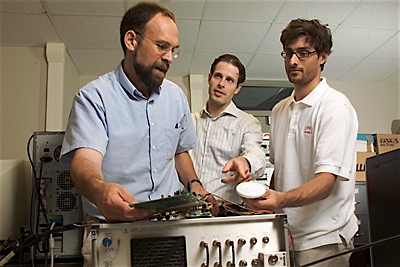US scientists hack secret codes of Europe’s GPS satellite!
Members of Cornell’s Global Positioning
System (GPS) Laboratory have cracked the so-called pseudo random number (PRN)
codes of Europe’s first global navigation satellite, despite efforts to
keep the codes secret. That means free access for consumers who use navigation
devices...

Mark Psiaki and helpful grad students
Members of Cornell’s Global Positioning System (GPS) Laboratory have cracked the so-called pseudo random number (PRN) codes of Europe’s first global navigation satellite, despite efforts to keep the codes secret. That means free access for consumers who use navigation devices — including handheld receivers and systems installed in vehicles — that need PRNs to listen to satellites.
In late January, Mark Psiaki, associate professor of mechanical and aerospace engineering at Cornell and co-leader of Cornell’s GPS Laboratory, requested the codes from Martin Unwin at Surrey Space Technologies Ltd., one of three privileged groups in the world with the PRN codes.
“In a very polite way, he said, ‘Sorry, goodbye,’” recalled Psiaki. Next Psiaki contacted Oliver Montenbruck, a friend and colleague in Germany, and discovered that he also wanted the codes. “Even Europeans were being frustrated,” said Psiaki. “Then it dawned on me: Maybe we can pull these things off the air, just with an antenna and lots of signal processing.”
Within one week Psiaki’s team developed a basic algorithm to extract the codes. Two weeks later they had their first signal from the satellite, but were thrown off track because the signal’s repeat rate was twice that expected. By mid-March they derived their first estimates of the code, and — with clever detective work and an important tip from Montenbruck — published final versions on their Web site on April 1. The next day, NovAtel Inc., a Canadian-based major manufacturer of GPS receivers, downloaded the codes from the Web site and within 20 minutes began tracking GIOVE-A for the first time.
Afraid that cracking the code might have been copyright infringement, Psiaki’s group consulted with Cornell’s university counsel. “We were told that cracking the encryption of creative content, like music or a movie, is illegal, but the encryption used by a navigation signal is fair game,” said Psiaki…
“Imagine someone builds a lighthouse,” argued Psiaki. “And I’ve gone by and see how often the light flashes and measured where the coordinates are. Can the owner charge me a licensing fee for looking at the light? … No. How is looking at the Galileo satellite any different?”
Understand the root of this activity. Because Galileo and GPS share frequency bandwidths, Europe and the United States had signed an agreement whereby some of Galileo’s PRN codes must be “open source.” The Europeans reneged on that agreement.
Posted: Mon - July 10, 2006 at 06:04 AM